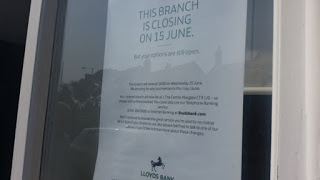The ongoing rolling programme of bank closures affects all of us, but, certainly not equally - Age Cymru, have raised concerns about the impact of bank closures on older people (across our Wales). Some people find themselves the wrong side of the digital divide, older people may struggle to access their money as they are unable to access branches and some are unable to use or access on-line banking.
Age Cymru research has noted that over half of over 75’s still do not have access to the internet and fewer access internet banking. Older people also may find themselves living on a limited budget, and some prefer to use cash, as it’s easier to budget their finances week by week, to pay for services.
Our few remaining High street banks actually enable older people to access and manage their accounts through the post office network, but, the number of post offices has been reduced in recent years. This is a consequence of the pre privatisation re-education post office closure programme that was carried out by New Labour and the Conservative - Liberal Democrat coalition government.
The closure of high street banks also makes it difficult for small businesses and shops to operate on local high streets, which are also places which some older people find easier to visit, rather than out of town shopping centres. Access to cash on the high street plays an important part in ensuring that older people have much more financial inclusion, security and social interaction.
Bank numbers have fallen over recent years, down nine percent up until March 2020, from 405 to 370 - a trend the Age Cymru and others believe is only going to continue. The ability to make deposits and withdrawals for basic, current and business accounts that are held with high street banks and building societies is important and should be retained.
We need a risk free Post Office Savings type bank – it is a pity that it was recklessly sold off by a previous Conservative government on the cheap - separate from the big four commercial banks. Now this is not about living in the past, we are where we are because of the demise of the regional banks, which was as part of the relentless rise of the big 4 banks which also led to the growth of the reckless casino banking and cheap credit that brought about the financial crash.
We cannot turn the clock back, nor should we try, but, we do need to think and act differently. We need to be honest with ourselves sorting the mess out is not going to be easy, but, it can be done, and there is no reason why it can be community beneficial – as has been said before we need some sort of community owned community beneficial Wales savings bank or perhaps even a Bank Cambria.

